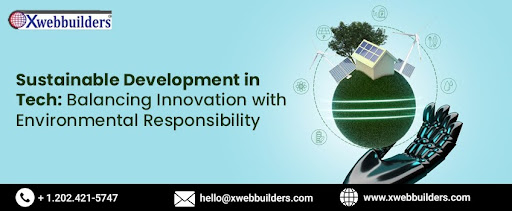
May 11, 2025

In an era where technology permeates every facet of our lives, the tech industry's environmental impact has come under increasing scrutiny. The rapid growth of this sector has led to concerns about carbon footprints, e-waste, and energy consumption. However, the tech world is not just part of the problem; it can also be a catalyst for sustainable solutions. This blog by our Digital Marketing Agency explores the imperative of sustainable development in the tech industry, the challenges it faces, and innovative approaches to balance progress with environmental responsibility.
The ubiquity of technology has undeniably brought about significant benefits to society, but it has also come at an environmental cost. Several environmental challenges have emerged:
1) Energy Consumption: Data centers, devices, and networks demand substantial energy. In 2018, data centers alone were estimated to consume about 1% of the world's electricity, with this figure steadily rising.
2) E-Waste: The rapid obsolescence of gadgets and devices has led to a surge in electronic waste. Most e-waste ends up in landfills, posing severe environmental and health hazards.
3) Resource Depletion: The extraction of rare metals and minerals necessary for tech manufacturing contributes to habitat destruction and resource depletion.
4) Carbon Footprint: The carbon footprint of tech companies, fueled by data centers and global operations, is a significant contributor to greenhouse gas emissions.
Recognizing these challenges, many tech giants are increasingly embracing sustainability as a core principle. Here are some notable initiatives:
1) Renewable Energy: Leading tech companies are investing heavily in renewable energy sources. Apple, for instance, has pledged to make its entire supply chain and product life cycle carbon-neutral by 2030.
2) E-Waste Management: Some tech firms are taking responsibility for the full life cycle of their products, from design to recycling. Dell has launched a circular economy initiative, aiming to recycle an equivalent product for every product sold by 2030.
3) Carbon Offsetting: Tech companies are investing in reforestation and carbon offset projects to compensate for their emissions. Microsoft has committed to being carbon negative by 2030.
4) Energy Efficiency: Data center energy efficiency has become a priority. Google's data centers, for example, claim to be 50% more energy-efficient than the industry average.
Sustainable development in tech isn't just about reducing harm; it's also about harnessing innovation for positive change:
1) Internet of Things (IoT): IoT devices are helping monitor and optimize energy usage in buildings, cities, and industries. Smart grids, for instance, reduce energy waste by dynamically adjusting supply to demand.
2) Artificial Intelligence (AI): AI is being used to predict and optimize energy consumption, reduce waste, and enhance resource management. Machine learning algorithms can optimize logistics and supply chains to minimize environmental impact.
3) Circular Economy: Tech companies are exploring the concept of a circular economy where products are designed for durability, repairability, and recycling. Modular smartphones and sustainable materials are emerging trends.
4) Renewable Tech: Advancements in renewable energy technologies, such as solar panels and wind turbines, continue to make clean energy more accessible and affordable.
5) Sustainable Data Centers: Data centers are evolving with innovations like liquid cooling, which is more energy-efficient than traditional air cooling.
Government regulations and policies play a crucial role in steering the tech industry towards sustainability. The European Union, for example, has adopted the Circular Economy Action Plan, setting ambitious goals for recycling and reducing e-waste. The California Consumer Privacy Act (CCPA) and the General Data Protection Regulation (GDPR) have also encouraged responsible data management practices.
While there's undeniable progress in tech and Digital Marketing Services, sustainable development in tech isn't without its challenges and critiques:
1) Greenwashing: Some companies may exaggerate their environmental efforts for public relations purposes, a practice known as greenwashing.
2) E-Waste Export: E-waste is often exported to developing countries, creating environmental and health issues in those regions.
3) Fast-Paced Innovation: The rapid pace of tech innovation can lead to short product lifecycles and a focus on the latest, rather than the most sustainable, technology.
4) Ethical Supply Chains: Ensuring ethical supply chains for rare minerals and metals remains a challenge.
As our world faces pressing environmental challenges, any Digital Marketing Company can agree that the future of sustainable tech development has never been more critical. With innovative solutions, responsible practices, and a growing global consciousness, the tech industry is poised to drive substantial change. Here's a glimpse into what the future holds for sustainable tech development.
1) Renewable Energy Integration: One of the most significant trends in sustainable tech development is the integration of renewable energy sources. Solar, wind, and hydropower are becoming more efficient and cost-effective, leading to increased adoption. Expect to see not only tech companies but entire cities and data centers powered by renewable energy, significantly reducing carbon footprints.
2) Circular Economy Principles: The concept of a circular economy, where products are designed for longevity, repairability, and recyclability, will become mainstream in the tech industry. Modular devices, sustainable materials, and robust recycling programs will minimize e-waste and resource depletion.
3) Eco-Friendly Materials: Innovations in materials science will yield eco-friendly alternatives to traditional components. Biodegradable plastics, sustainable metals, and organic semiconductors will replace environmentally harmful materials in electronics and packaging.
4) Green Data Centers: Data centers are notorious energy hogs, but they are also evolving. Energy-efficient cooling solutions, like liquid immersion, and the use of AI to optimize data center operations will significantly reduce their environmental impact.
5) Sustainable Transportation: Tech-driven advancements in electric and autonomous vehicles are already changing the transportation landscape. The future holds a transition from internal combustion engines to electric vehicles, reducing emissions and reliance on fossil fuels.
6) AI and Predictive Analytics: Artificial intelligence will play a pivotal role in sustainability efforts. AI-driven algorithms will optimize energy consumption, manage resources more efficiently, and predict environmental changes to mitigate disasters.
7) Smart Cities: The development of smart cities will continue to grow, enhancing urban sustainability. IoT sensors, real-time data analysis, and autonomous systems will optimize energy use, transportation, waste management, and public services.
8) Sustainable Agriculture: Tech solutions will address food security and sustainable agriculture. Precision agriculture, vertical farming, and AI-driven crop management will maximize food production while minimizing resource usage.
9) Water and Waste Management: Advanced tech will improve water purification and waste management systems. IoT sensors will monitor water quality and usage, while AI-driven models will optimize waste recycling and disposal.
10) Collaboration and Regulation: Collaboration between governments, industries, and environmental organizations will be vital. Stricter regulations and international agreements will encourage companies to adopt sustainable practices and technologies.
Sustainable development in tech is an ongoing journey, requiring continuous innovation, regulation, and a shift in mindset. The tech industry has the potential to be a driving force for positive change, leveraging its innovation to tackle pressing environmental issues. However, this transformation demands a commitment to transparency, accountability, and long-term thinking.
As consumers, we also play a role by supporting companies that prioritize sustainability, demanding transparency, and holding corporations accountable for their environmental impact. In the quest for a sustainable future, the tech industry has a pivotal role to play in balancing innovation with environmental responsibility, ensuring that our digital advancements don't come at the expense of our planet. For more information or to avail services of our best Digital Marketing Company in Ashburn USA, visit Xwebbuilders.com .